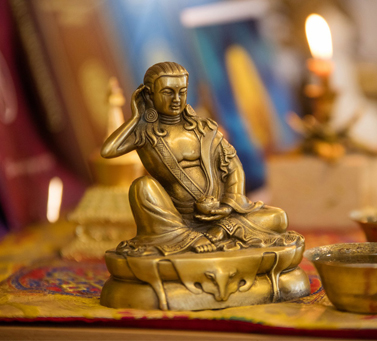
Teaching and Learning
By the time of this song, Milarepa was beginning to instruct his disciples. It is quite important for a person’s development that at a certain stage that person must try to impart their knowledge to others. In doing so, if their teaching is not based on a self-consciousness and ego, if they are teaching correctly and directly, then teaching seems to be one of the ways of training the person himself or herself. This has happened in the lives of many great teachers, and it was the same for Milarepa. He was forced to teach people: he had to talk to people and impart his knowledge to others. And whether the situation was forced on him to not, he could not avoid doing so.
One might say that it is a creation of the dakini force that one has to be able to learn from others – and in order to learn from others, one also has to give teaching. In other words, teaching a way of training oneself. But being a teacher does not mean that a person has reached ultimate realization. A teacher is still one of the students on the path; in this case, you are learning by teaching, so you are studying in a different way. To do so, you do not have to be a completely enlightened person.
The trouble seems to be with the general viewpoint that, if someone is actually teaching, then he or she must be an enlightened person, capable of teaching completely all the way long. But that need not to be so. A person could be teaching and, in the process of teaching, hear people ask all sorts of questions, which could be questions they themselves had. Certain questions could be associated with that teacher’s own doubts, and certain questions could have an element of confirming that teacher’s own knowledge.
This is rather like bodhisattva practice. Bodhisattvas, starting with the first bhumi* up to the tenth bhumi, work for other sentient beings. They practice things such as generosity, morality, patience, energy, concentration, wisdom, and so on. Teaching is the same kind of practice, because you have learned that you cannot just develop yourself, but you have to associate with other people. Your knowledge could develop by communicating with others. So teaching is not about making yourself the complete authority or about being a great teacher who is completely enlightened, awakened person.